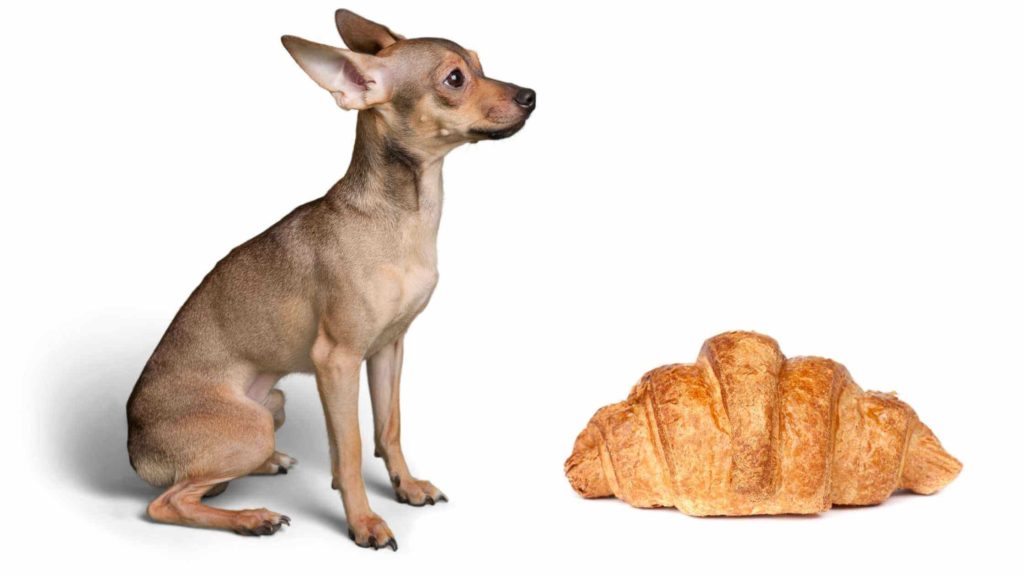
While many pet parents want to share human food with their dogs, few types are recommended for your furry friend. What about buttery, flaky croissants? Can dogs eat croissants? Here’s what you need to know!
While dogs can eat croissants, they shouldn’t eat them. These are unhealthy treats and saturated with butter, sugar, yeast, and flour. They can cause health problems in your dog, including high blood sugar content, excessive amounts of fat, and potential pancreas damage. Some croissants can contain toxic ingredients.
What are the dangers of croissants?
Croissants are just delicious and flaky sweet bread, right? So, what’s so dangerous about them? Several things can cause an adverse reaction in your dog, including:
- Ingredient poisoning
- Overloading on sugar and fat
- Ingesting yeast
- Filling ingredients
Ingredient poisoning
Some croissants will have dangerous and poisonous ingredients in them for dogs. We’ll go into those in more detail below, but some of the most common include onion, garlic, and xylitol. Since these are designed for human stomachs and not dog stomachs, most labels won’t warn about these ingredients, so you’ll have to watch for them manually!
Overloading on sugar and fat
Croissants have excessive sugar and fat in them, even for humans! Dogs have smaller tolerances, so they’ll overload quickly on both of these things from just one croissant. This can lead to health concerns, which we’ll talk about below.
Ingesting yeast
Yeast is responsible for the puffy and flaky croissant you expect. If your dog eats yeast from croissant dough (i.e., unbaked). In that case, the yeast can continue to swell in their stomach, damage organs, and put pressure on their body as it struggles to digest. Nothing about that sounds good, right?
Filling ingredients
If you are eating dessert croissants, they’ll often contain fillings such as chocolate, strawberry, etc. These will be laced with additional sugar and add more problems to your dog’s diet and health profile.
What can happen to my dog if I feed them croissants?
Your dog’s health will never benefit from eating croissants. The actual health risks will differ depending on the active ingredients in the croissants. However, the most common shared health conditions are spread throughout the different types of croissants.
Obesity is the biggest health risk for your dog. Since croissants are loaded with butter and sugar, Having croissants regularly and/or in large servings can cause your dog to gain weight and become obese.
Dogs can also include organ damage from the bad/excessive ingredients in the croissants. Common damage from croissants includes that to the lungs and the pancreas. This damage will require vet treatment and can be a chronic problem for dogs who eat too many croissants!
Dental issues
Dental issues such as gingivitis and cavities are common because of the high amount of sugar in croissants. You’ll need to prioritize your dog’s dental hygiene regardless of what they eat, but this is especially important if they get a lot of sugary treats!
Diabetes
Too much sugar and fat can trip diabetes in your dog, too, which will be a chronic health condition that requires proper treatment and management. Depending on your dog’s age, this can make for a long life dealing with it, or it can worsen other health-related conditions that your dog is dealing with.
None of these sound good, of course, and all of these are common complications for your dog eating plain croissants. However, many types are harmful and dangerous, as we’ll go into below.
Harmful ingredients in croissants for dogs
As mentioned, these are designed for human stomachs rather than dog stomachs. This means that your dog will unknowingly eat ingredients that are actually dangerous to their health — potentially even life-threatening!
Raisins are dangerous to dogs due to their relationship to grapes. Raisins are toxic to dogs and can cause symptoms such as tremors, stomach pain, and lethargy. Eating raisin croissants will require immediate vet treatment to help counteract the symptoms of the raisins in your dog!
Another dangerous ingredient is xylitol. This is used in place of sugar and is often used without warning those buying the croissants. It is toxic to dogs and will cause weakness, vomiting, coma, and death. Even in small doses, this is a dangerous ingredient!
Lastly, the potential of yeast; If your dog gets hold of uncooked dough or undercooked croissants from a “toss batch,” for example, it can expand in the stomach and create a blockage and cause damage directly to the organs themselves. This is a hazardous ingredient that is required in croissants!

Is flour a toxic ingredient for dogs?
No, flour isn’t a toxic ingredient for dogs assuming that your dog is not allergic to wheat! You’ll still want to limit how much they have, as it is a rich ingredient for dogs!
Can dogs eat butter croissants?
Dogs can’t safely eat butter croissants, no. The high butter and high sugar content will cause them to have an upset stomach at the least and potentially trigger short-term or chronic pancreatitis at the most. These might be free of the most dangerous ingredients, but they still have a lot of danger for your dog’s health profile.
Can dogs eat almond croissants?
Almond croissants aren’t safe for your dogs. The almonds are commonly flaked into thin slivers. This flaked croissant will cause a choking hazard and build up in your lungs. Difficult to remove, it can cause breathing problems and more!
Can dogs eat ham and cheese croissants?
Dogs can’t eat ham and cheese croissants, no. Aside from the dangerous ingredients in plain croissants, the ham and cheese contain excessive salt and fat content. The cheese can also trigger lactose intolerance symptoms in many dogs. Also, onion and potentially garlic are often added to these kinds of savory croissants. These are both dangerous for dogs to the point of being potentially toxic!
Can dogs eat chocolate croissants?
Dogs should never eat chocolate croissants, be they the ones with chocolate mixed into their flour or filled with chocolate. Chocolate is deadly to dogs and should be avoided at all costs. As we’ve discussed, the same goes for anything with grapes or raisins!
Symptoms to look for if my dog ate croissants
If your dog had an unauthorized snack of your croissant, there are some symptoms that you can watch for that mean your dog is having a negative reaction to one or more of the ingredients! Symptoms include:
- Panting
- Excessive thirst
- Rumbly stomach
- Vomiting
- Diarrhea
- Tremors
- Signs of distress
The more of these that you notice in your dog, the more you need o take them to the vet. Time is your friend when dealing with a potential overdose of ingredients or a potential poisoning. Don’t wait until the next available business day since your dog may not make it until then!
How to prevent my dog from eating croissants?
No matter what point of view you want to take on it, croissants are not a good idea for your dog to eat! So, preventative measures are a great idea to help keep those harmful (albeit delicious) treats away from your dog!
Stock your pantry properly
When filling your pantry, have a dedicated section for dog treats! You can give one of these to your dog when eating a croissant. They’ll enjoy this special treat and won’t even notice that it’s not what you are eating — seriously!
Ignore puppy eyes
It’s so hard to ignore those cute eyes staring up at you as you’re trying to eat your treat, but it’s essential! These puppy dog eyes don’t understand that what they want can hurt them, and responsible pet parents must be stronger than the puppy dog eyes!
That’s where dog-safe treats can help curb it. Or, enjoy your treat in a space that your dog doesn’t go in often if you are struggling with it.
Teach your dog table manners
If the puppy dog eyes and whining are bothering you, you can teach your dog table manners! It’s a great idea to help your dining experience stay as frustration-free as possible. When teaching basic obedience training, teach them to lie down while you’re eating, or at least stop the puppy dog eyes.
Your dog will always want to obey you, and it can help you resist that adorable look when it comes to choosing between giving in and potentially hurting them or not.
Remember the danger
Simple but true. If you remember the risk that you are putting your dog in every time you feed them a croissant, it is easier to resist and redirect their attention. If you have to, put a list of reasons not to feed your dog croissants on your fridge for just this purpose!
In general
Technically dogs can eat croissants, but they shouldn’t. They contain many unhealthy ingredients, such as lots of butter, sugar, and yeast. Many include dangerous ingredients like almond flakes, chocolate, and onion salt.
There is no health benefit to eating croissants, and many risks, so pet parents should understand the symptoms of a problem and what to do if their dog is showing them!
When dogs eat croissants, they put themselves in danger of short-term health problems, chronic health conditions, and even death. You’ll want to do what you can to keep your dog healthy by keeping them away from these delicious treats!
Know someone prone to sharing with their furry friend? Share this with them!
